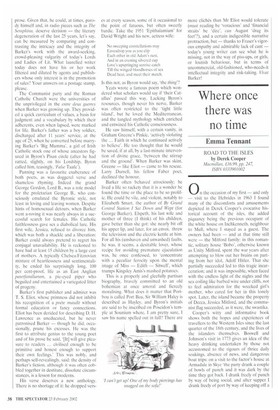Where once there was no time
Emma Tennant
ROAD TO THE ISLES by Derek Cooper Macmillan, £16.99, pp, 247, ISBN 0333901002
0 n the occasion of my first — and only
visit to the Hebrides in 1963 I found many of the discomforts and amusements depicted in Derek Cooper's evocative historical account of the isles, the added piquancy being the previous occupant of the white house on Inchkenneth, neighbour to Mull, where I stayed as a guest. The owners had been — and at that time still were — the Mitford family: in this romantic, solitary house 'Bobo', otherwise known as Unity Mitford, spent the war years after attempting to blow out her brains on parting from her idol, Adolf Hitler. That she partially succeeded led to this tragic incarceration; and it was impossible, when faced with the endless light of the nights and the sea coiling like barbed wire under cliffs, not to feel admiration for the wrecked girl's mother, who cared for her in this lonely spot. Later, the island became the property of Decca, Jessica Mitford, and the communist flag succeeded, as it were, the swastika.
Cooper's witty and informative book shows both the hopes and experiences of travellers to the Western Isles since the last quarter of the 18th century, and the lives of the islanders themselves. Boswell and Johnson's visit in 1773 gives an idea of the heavy drinking undertaken by those not accustomed to the rigours of thrice daily soakings, absence of news, and dangerous boat trips; on a visit to the factor's house at Armadale in Skye 'the party drank a couple of bowls of punch and it was dark by the time they got back. I drank freely of punch by way of being social, and after supper I drank freely of port by way of keeping off a
tedium vitae,' Boswell reports. 'Altogether, I had too much.'
Too much — or too little — appears to be the story of those lucky (or unfortunate) enough to find themselves born natives to the Hebrides. For while the lairds astonished visitors with the bounty of their tables — a typical dinner would include a large dish of minced beef collops, a large dish of fricassee of fowl, ham or tongue, haddock and herring, bread pudding and rich milk, frothed, to be followed by a syllabub made with port wine — the crofters and fishermen often made do with a diet of herring. Hospitality, though gracious in some quarters, with a household keeping a resident piper or fiddler in order that the long, dark nights should be filled with 'mirth and glee', could be of a rough variety. James Hogg, the Ettrick shepherd, arrived at Stornoway in June 1803, to find the inn disturbed by 'a fight going on in the room adjourning ... desperate wounds were given and received, the door was split in pieces.' Despite experiencing this primitive version of The Shining, Hogg, as a practising poet, managed to write rhapsodic lines about the moon as it hovered about the Shiant Isles, and exhorted readers in his rhyming paean to the Hebrides: 'Now hear it from wild fowls which over me scream.'
An engaging aspect of this book dedicated to the beauties and trials of life in often roadless islands, is Cooper's understanding of what 'timeless', a word worked to death by travel brochures, actually means. The concept is best defined by John Macculloch, a surgeon who spent a part of each year. in the early 19th century, in the magical isles. Time. said Macculloch, does not exist.
Need you wonder now how happily people can live in the Highlands, how easily they can find employment, even in such solitude as this, and how little time can hang heavy on those hands that have found so many expedients for occupying it ... Time is never present, but always past or to come. It is always too soon to do anything, until it is too late: and thus vanishes the period of wariness and labour and anxiety and expectation and disappointment which lies between the cradle and the grave.
Despite this, Macculloch is quick to point out that islanders are not witless as a result of their comparative inactivity.
I never entered the blackest hut without having what was to be given, the milk-tub, the oatcake, the eggs if it was possible to persuade the hens to do such a deed ...
In giving us the travels to the isles of Lord Cockburn, Walter Scott, Keats and many others, Derek Cooper, a long-time campaigner for good food and one who regards the Hebrides as his home, has produced an enjoyable picture of life in places where once there was no time.
Emma Tennant's tiext book, Felony: The Private History of the Aspern Papers, will be published by Cape in the autumn.







































































 Previous page
Previous page